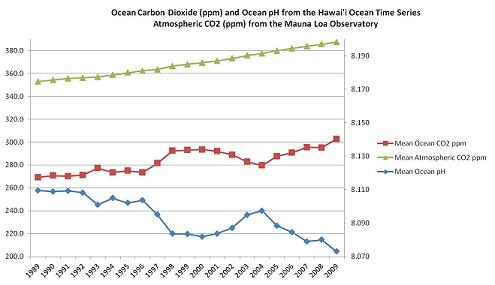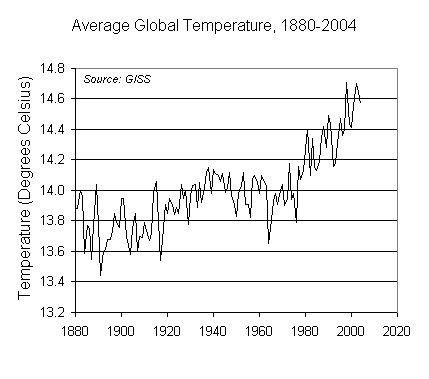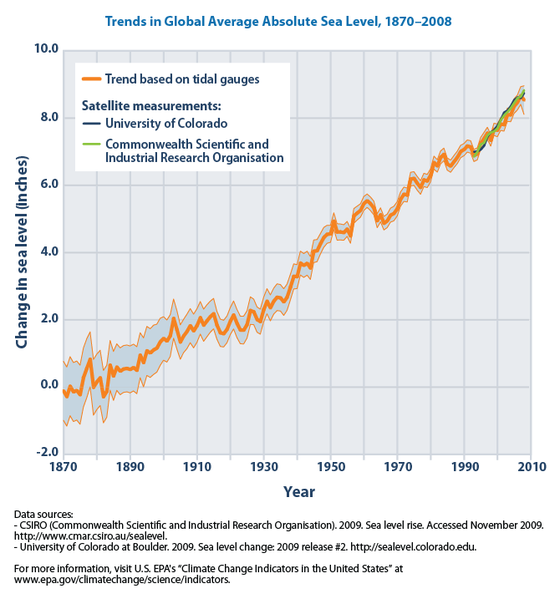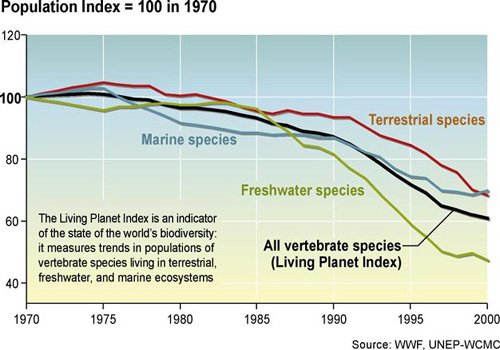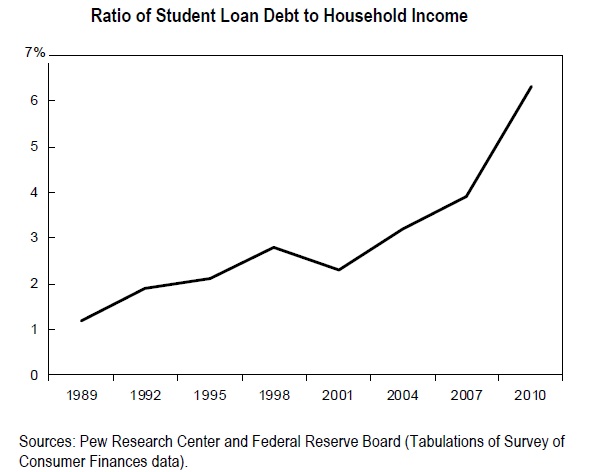Today’s young people have a monumental mess on their hands. To clean it up, they will need character, determination, and ingenuity. But the first step toward fixing a broken system, is to acknowledge its failure.
What economists call “externalities” have never been fully integrated into the equation of exchange in the extant capitalist system, and a closer examination of the evidence reveals that our predilection to overtax the natural support systems furnished by our planet has brought us perilously close to a point of ecosystemic and economic collapse.
In early May of 2013, the U.S. National Oceanic and Atmospheric Administration’s carbon dioxide meter at the summit of Mauna Loa, on the island of Hawaii, reached an historic milestone, surpassing 400 parts per million for the first time since measurements began in 1958. More worrisomely, NOAA scientists observe, the rate of annual increase in this concentration has accelerated. And while the correlation between carbon dioxide concentrations in the atmosphere and global temperatures is well established, an equally important figure—though one commonly overlooked by the majority of talking heads—is the acidification of the world’s oceans, which continues to threaten all manner of sea life, and, indirectly, the future viability of our own species.
In the following chart, the rise in atmospheric carbon dioxide concentrations at Mauna Loa is compared to oceanic carbon dioxide concentration and pH—also measured from the island of Hawaii.
Fig. IX
(Source: Hawaii Ocean Time Series, University of Hawaii. Retrieved from Skeptical Science http://www.skepticalscience.com/ocean-acidification-global-warming-intermediate.htm)
And let there be no doubt, that the rise in global carbon dioxide emissions is indeed correlated to a rise in global average temperatures,
Fig. X
(Source: NASA Goddard Institute for Space Studies. Retrieved from Earth Policy Institute http://www.earth-policy.org/indicators/C51/temperature_2005)
and a rise in global sea level.
Fig. XI
(Retrieved from Wikimedia Commons http://commons.wikimedia.org/wiki/File:Trends_in_global_average_absolute_sea_level,_1870-2008_%28US_EPA%29.png)
However, another key issue which receives minimal attention in the public discourse compared to climate change is global biodiversity loss.
“We’ve reached a point where efforts to preserve species and biological diversity might no longer be an act of altruism,” noted ecologist Diane Srivastava, of the University of British Columbia, in 2012. In light of all the ecosystem services provided to human beings through the biodiversity that still exists on the planet, she and the co-authors of a research review conducted in 2012 concluded that the threat biodiversity loss poses to our way of life might be every bit as substantial as the climate menace.
The following figures, which date back to 1970, do not suggest that our efforts to curb the problem have been successful. (Note in particular an acceleration of the decline in some measures of biodiversity beginning around 1980, when countries that had taken IMF and World Bank loans saw the rate of interest on those loans suddenly skyrocket.)
Fig. XII
(Retrieved from treks.org http://www.treks.org/arcticthe.htm)
Despite assurances to the contrary from defenders of the capitalist system in its present form, evidence from the natural world alone suggests that the status quo is unsustainable. But given the rising costs of housing and university tuition, combined with the virtual necessity of post-secondary education for any hope of securing a comfortable lifestyle, it’s also more difficult than ever before for this generation to opt out of the neoliberal capitalist system. In Canada, student debt is not nearly as onerous as it is in the U.S., but tuition costs continue to outpace the rise in inflation. Add this to the fact that low-paid service jobs have dominated the recovery from the Great Recession in both countries, and the prospects for the crisis generation are, arguably, worse than those their parents faced—all in an economic system whose primary claim to legitimacy is that it (supposedly) raises the living standards of all of its participants.
Fig. XIII
As American philosopher, professor and political dissident Noam Chomsky puts it:
Students who acquire large debts putting themselves through school are unlikely to think about changing society. When you trap people in a system of debt, they can’t afford the time to think. Tuition fee increases are a “disciplinary technique,” and, by the time students graduate, they are not only loaded with debt, but have also internalized the “disciplinarian culture.” This makes them efficient components of the consumer economy.
It all lends credence to Occupy’s contention that radical, systemic change is needed—and very soon.
Paradoxically, the corporate state, indomitable though it may appear, increasingly seems to fear for its future. This might be why it lashes out in fitful displays of violence against peaceful protesters, repression of individual freedoms, draconian laws like the Patriot Act, National Defense Authorization Act, Foreign Intelligence Surveillance Act, and Canada’s Bill S-7, allowing pre-emptive arrests of virtually anyone in the country provided police have evidence that an act of “terror” may be committed. State surveillance of political activists has also intensified.
These are among the reasons why millions of people have taken to the streets, recognizing a threat to not only their democratic freedoms, but to the viability of future generations as well. The program of control and domination on the part of state powers, and their corporate collaborators, has also inspired courageous whistleblowers—like former National Security Agency employees Thomas Drake, Jesselyn Radack, Edward Snowden, and US Army Private Chelsea (formerly Bradley) Manning—to risk liberty and career in order to expose the surreptitious violations of human rights and privacy undertaken by the U.S. government and its allies. The consequence has been a vigorous public debate over the role of government, and how far the privilege of maintaining state secrets ought to extend. But the revelations have also unveiled the depth of the corruption of the state-corporate complex that has developed in the U.S., the U.K., Canada, and several other Western powers.
Judy Rebick, co-founder of Canadian progressive news web site Rabble, is now in her fifth decade of social justice activism. She notes that while popular discontent can lead individuals and groups to protest, it is typically a crisis or catastrophic threat that serves as a precursor to conflagrations on the scale of Occupy, or the anti-war and anti-colonial movement of the 1960s.
“In the ‘60s, we had the threat of nuclear annihilation. And now we have that again…but we have it in a different way,” says Rebick, in reference to the ecological crisis. “So maybe it takes that kind of threat to get people off their asses, so to speak…especially in North America.”

